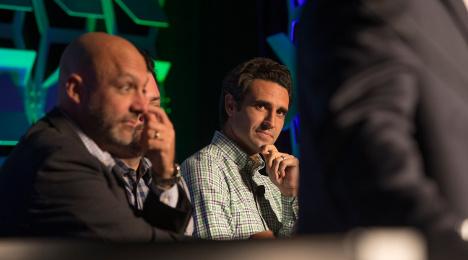Uses for Carlypso tools at Carvana ‘clear and take many forms’

Carvana CEO Ernie Garcia, seen in the middle of this image from a panel discussion during last year's Used Car Week in Las Vegas. (Photo by Jonathan Fredin)
By subscribing, you agree to receive communications from Auto Remarketing and our partners in accordance with our Privacy Policy. We may share your information with select partners and sponsors who may contact you about their products and services. You may unsubscribe at any time.
PHOENIX –
In buying Carlypso, Carvana got that homeowner’s toolset you might find at the hardware store — the one with all those extra pieces you need for the next job around the house.
Carlypso began as a peer-to-peer car-selling service, eventually becoming a managed marketplace where consumers could access wholesale vehicles directly, Carvana explained in a news release.
Bringing that kind of company into the fold at Carvana — which announced the deal Tuesday, the same day as its latest quarterly earnings were released — gives the Phoenix-based online car retailer some extra torque.
With some of the integration already started, that extra utility should start to arrive this quarter, with “more meaningful benefits” coming in the next year, said Carvana chief executive officer Ernie Garcia.
“Carlypo’s business had been focused on making vehicles at auction available to customers by merchandising and listing those cars on its site, prior to purchasing the cars. This focus caused them to build a toolset that is powerful and highly complementary to our own,” Garcia said during opening remarks of Tuesday’s call with investors.
“Getting high quality vehicle data describing which features, options and packages are on any given car, and valuing those features and options is a notoriously difficult problem in the automotive industry,” he said. “Carlypso built a number of tools that collect and clean vehicle data from many disparate sources, and then analyze that data to properly understand the value of each car.
Subscribe to Auto Remarketing to stay informed and stay ahead.
By subscribing, you agree to receive communications from Auto Remarketing and our partners in accordance with our Privacy Policy. We may share your information with select partners and sponsors who may contact you about their products and services. You may unsubscribe at any time.
“The uses for us of these tools are clear and take many forms: automated bidding optimization in vehicle acquisitions across channels, including direct-from-consumer; merchandising inventory with better vehicle descriptions; and price optimization of vehicles available for sale on our site,” Garcia said.
Build vs. buy: More purchases on way?
During the call, the executive team was asked about potential for future acquisitions on the tech front and where buying versus building to obtain additional capabilities might make more sense.
Garcia left the door open for future purchases, but emphasized that it’s not a focal point for the company.
“I don’t want to say anything too definitive here, because I think we will opportunistically kind of look at opportunities as they become available,” Garcia said. “But in general, we don’t anticipate doing a lot of acquisitions.
“We don’t think that’s a big part of our strategy. I think we’d be highly unlikely to do any operating acquisitions or trying to integrate operations. I think an acquisition like this one that is really kind of folding technology into the business in ways that we think are supportive of our core objectives, I think those sorts of acquisitions could occur in the future, but we don’t have anything that we’re looking at today.”
More details on Carlypso
As far as the recent purchase, Carvana has brought Carlypso co-founders Chris Coleman and Nicky Hinrichsen on board into leadership roles. Coleman is heading up vehicle data acquisition and normalization, with Hinrichsen leading wholesale and trade technology.
Each of those co-founders are working with Carvana on strategies for centralized inventory acquisition along instant valuation offers for shoppers who want to trade-in or sell their cars.
That perhaps plays into what Carvana noted about its new acquisition in a news release Tuesday: “Carlypso focused on ingesting, normalizing and organizing data on vehicles that they could not physically inspect, and scaling that process to analyze over 200,000 cars each day,” it said.
“The company developed proprietary big data, analytics, and machine learning tools to dynamically filter, value and price cars nearly instantaneously without ever actually seeing them; tools that can integrate with similarly purposed proprietary technology Carvana has created.”
Coleman, the Carlypso co-founder, added: “When studying wholesale and retail prices in late 2014, we serendipitously discovered abnormally high spreads on some vehicles, which presented amazing deals for our customers. We became obsessed with decoding opaque vehicle data to extreme accuracy in order to find a wider range of inefficiencies in the market.
“We’d transitioned from an online car dealer to a data science company. Bringing our insights to Carvana, the biggest disruptor in our business, meant we could keep innovating with even more horsepower.”
The companies did not disclose terms of the transaction.


